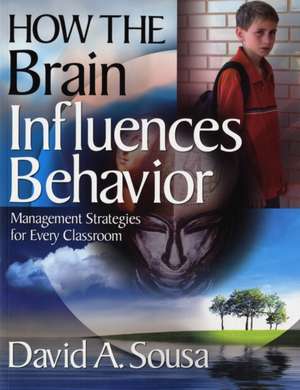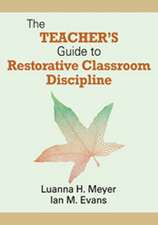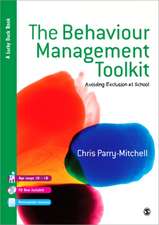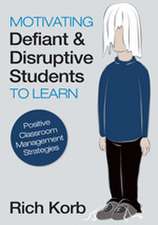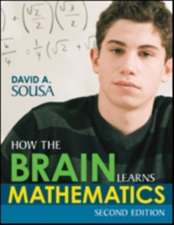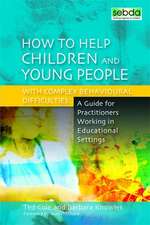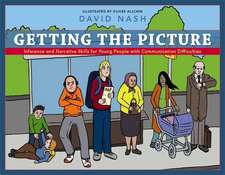How the Brain Influences Behavior: Management Strategies for Every Classroom
Autor David A. Sousaen Limba Engleză Paperback – 3 sep 2008
This resource includes basic brain facts that can help teachers assist students in behaving, information on how the brain's processes impact behavior, and tips on deterring inappropriate behaviour in the classroom.
| Toate formatele și edițiile | Preț | Express |
|---|---|---|
| Paperback (1) | 347.83 lei 6-8 săpt. | |
| SAGE Publications – 3 sep 2008 | 347.83 lei 6-8 săpt. | |
| Hardback (1) | 608.67 lei 6-8 săpt. | |
| SAGE Publications – 3 sep 2008 | 608.67 lei 6-8 săpt. |
Preț: 347.83 lei
Nou
Puncte Express: 522
Preț estimativ în valută:
66.56€ • 69.68$ • 55.07£
66.56€ • 69.68$ • 55.07£
Carte tipărită la comandă
Livrare economică 05-19 aprilie
Preluare comenzi: 021 569.72.76
Specificații
ISBN-13: 9781412958707
ISBN-10: 1412958709
Pagini: 264
Dimensiuni: 216 x 279 x 18 mm
Greutate: 0.73 kg
Ediția:1
Editura: SAGE Publications
Colecția Corwin
Locul publicării:Thousand Oaks, United States
ISBN-10: 1412958709
Pagini: 264
Dimensiuni: 216 x 279 x 18 mm
Greutate: 0.73 kg
Ediția:1
Editura: SAGE Publications
Colecția Corwin
Locul publicării:Thousand Oaks, United States
Recenzii
“This winning book presents clearly outlined brain research as it applies to proactively managing classroom discipline issues. A must-have for teachers who prefer to not only teach, but effectively reach every student too!”
“This book is a must-read for those interested in managing classroom behavior in a manner that is both effective and research based.”
“This is a timely topic with workable solutions that enables students to learn in today’s classrooms. A must-read for educators working with diverse populations.”
“This book is a must-read for those interested in managing classroom behavior in a manner that is both effective and research based.”
“This is a timely topic with workable solutions that enables students to learn in today’s classrooms. A must-read for educators working with diverse populations.”
Cuprins
About the Author
Acknowledgments
Introduction
Are Behavior Problems on the Rise?
Can Neuroscience Help?
About This Book
Questions This Book Will Answer
Chapter Contents
Other Helpful Tools
1. Handling Social Misbehavior
The Social and Emotional Brain
Emotional Processing
Pathways of Emotional Signals
What Leads to Social Misbehavior?
The Teacher Is the Key
Interventions for Handling Social Misbehavior
Dealing With Social Anxieties
Using Social Stories to Modify Behavior
A Case Study: Using a Social Story for a Verbally Aggressive Student
A Social Story for Angry Students
Summary
2. Dealing With Impulsive Behavior
What Leads to Impulsivity and Violent Behavior?
Genetic Variations
Prenatal Exposure to Cocaine
Cerebral Lesions
An Important Word About Testosterone
Ignorance of Rules of Behavior
Some Strategies for Controlling Impulsive Behavior
Cognitive and Cognitive-Behavioral Interventions
Putting Impulsive Problem Behavior in a Social Context
Using Picture Books to Curb Impulsive Anger or Anxiety
Other Suggested Strategies
Summary
3. Teaching Self-Control Through Self-Verbalization
Examining Self-Control
What Is Self-Control?
Are Children Learning Self-Control?
Brain Structures for Self-Control
Do Mirror Neurons Play a Role in Self-Control?
Losing Self-Control
Helping Students Regain Self-Control
Verbal Self-Contol of Aggressive, Defiant, or Other Behavior
The Power of Self-Talk
The ZIPPER Strategy
"Say No and Walk Away" to Resist Peer Pressure
Self-Control Through Self-Talk and Self-Monitoring
The Nature of Attention
Self-Monitoring for Other Problem Behaviors
Self-Control Through Self-Rating of Emotional Intensity
The Anger Thermometer
Summary
4. Managing the Behavior of Boys
Why a Concern With Boys?
Gender Differences in Behavior
Genetic and Environmental Factors
Impact of Biology
Some Research Findings on Behavioral Differences
Using Research-Based Strategies
Movement-Based Instruction and Classroom Management
Boy-Friendly Instruction and Discipline
The Responsibility Strategy
And What About Girls?
The Rise of Cyberbullying
Bullying Versus Cyberbullying
Dealing With Cyberbullying
Summary
5. Building Positive Relationships With Troubled Students
Relationships and Research
Insights From Neuroscience
Some Research Findings
Developing Teacher-Student Relationships
The Importance of Positive Relationships With and for Students
Reaching Unreachable Students With Dialogue Journals
The Lunch Bunch: An Educator's Idea
Managing Serious Behavior Problems Through Adult Mentoring
Summary
6. Using Peer Relationships to Modify Behavior
Examining Peer Relationships
Dealing With Peer Influence: A Two-Edged Sword
The Desire to Be Liked
Peer-Mediated Behavior Management Strategies
Peer-Mediated Anger Management
Factors to Consider in Peer Mediation
Peer Confrontation to Curb Misbehavior
The Mystery Motivator/Mystery Character Intervention to Decrease Inappropriate Behavior
Group Contingency Interventions
Summary
7. Managing Oppositional Behavior
What Is Oppositional Behavior?
Causes of Oppositional Behavior
Students With Oppositional Behavior in the Classroom
Teacher Knowledge of Oppositional Behavior
Teacher Frustration and Countercontrol
Defiant Students: Explosions Waiting to Happen
Avoiding Triggers for Misbehavior in the Classroom
Teaching Students to Relax
Other Strategies
What About Oppositional Defiant Disorder? (ODD)
Development of ODD
Treatment of ODD
Summary
8. Developing Positive Self-Esteem
The Nature of Self-Esteem
The Power of Self-Esteem
Research on Self-Esteem
Guidelines for Building Self-Esteem
Building a New Perspective on the Troubled Student: The Strength-Based Assessment
What Is Strength-Based Assessment?
Motivation and Attribution Retraining
Motivation Research and Attribution Theory
The "Shine My Light" Strategy
Summary
9. Putting It All Together
Educational Climate: Are We Happy Here?
What Is Classroom Climate?
The Biology of Happiness
Successful Behavior Management in the Classroom
Assessing Classroom Climate
Classrom Management and Cultural Diversity
Guidelines for Managing Diverse Classes
Positive Behavioral Supports in the Classroom
What Are Positive Behavioral Supports?
The Functional Assessment of Behavior
The Behavioral Improvement Plan
Multitiered Interventions and the Student Support Team
Summary
Conclusion
Appendix
Glossary
References
Resources
Index
Acknowledgments
Introduction
Are Behavior Problems on the Rise?
Can Neuroscience Help?
About This Book
Questions This Book Will Answer
Chapter Contents
Other Helpful Tools
1. Handling Social Misbehavior
The Social and Emotional Brain
Emotional Processing
Pathways of Emotional Signals
What Leads to Social Misbehavior?
The Teacher Is the Key
Interventions for Handling Social Misbehavior
Dealing With Social Anxieties
Using Social Stories to Modify Behavior
A Case Study: Using a Social Story for a Verbally Aggressive Student
A Social Story for Angry Students
Summary
2. Dealing With Impulsive Behavior
What Leads to Impulsivity and Violent Behavior?
Genetic Variations
Prenatal Exposure to Cocaine
Cerebral Lesions
An Important Word About Testosterone
Ignorance of Rules of Behavior
Some Strategies for Controlling Impulsive Behavior
Cognitive and Cognitive-Behavioral Interventions
Putting Impulsive Problem Behavior in a Social Context
Using Picture Books to Curb Impulsive Anger or Anxiety
Other Suggested Strategies
Summary
3. Teaching Self-Control Through Self-Verbalization
Examining Self-Control
What Is Self-Control?
Are Children Learning Self-Control?
Brain Structures for Self-Control
Do Mirror Neurons Play a Role in Self-Control?
Losing Self-Control
Helping Students Regain Self-Control
Verbal Self-Contol of Aggressive, Defiant, or Other Behavior
The Power of Self-Talk
The ZIPPER Strategy
"Say No and Walk Away" to Resist Peer Pressure
Self-Control Through Self-Talk and Self-Monitoring
The Nature of Attention
Self-Monitoring for Other Problem Behaviors
Self-Control Through Self-Rating of Emotional Intensity
The Anger Thermometer
Summary
4. Managing the Behavior of Boys
Why a Concern With Boys?
Gender Differences in Behavior
Genetic and Environmental Factors
Impact of Biology
Some Research Findings on Behavioral Differences
Using Research-Based Strategies
Movement-Based Instruction and Classroom Management
Boy-Friendly Instruction and Discipline
The Responsibility Strategy
And What About Girls?
The Rise of Cyberbullying
Bullying Versus Cyberbullying
Dealing With Cyberbullying
Summary
5. Building Positive Relationships With Troubled Students
Relationships and Research
Insights From Neuroscience
Some Research Findings
Developing Teacher-Student Relationships
The Importance of Positive Relationships With and for Students
Reaching Unreachable Students With Dialogue Journals
The Lunch Bunch: An Educator's Idea
Managing Serious Behavior Problems Through Adult Mentoring
Summary
6. Using Peer Relationships to Modify Behavior
Examining Peer Relationships
Dealing With Peer Influence: A Two-Edged Sword
The Desire to Be Liked
Peer-Mediated Behavior Management Strategies
Peer-Mediated Anger Management
Factors to Consider in Peer Mediation
Peer Confrontation to Curb Misbehavior
The Mystery Motivator/Mystery Character Intervention to Decrease Inappropriate Behavior
Group Contingency Interventions
Summary
7. Managing Oppositional Behavior
What Is Oppositional Behavior?
Causes of Oppositional Behavior
Students With Oppositional Behavior in the Classroom
Teacher Knowledge of Oppositional Behavior
Teacher Frustration and Countercontrol
Defiant Students: Explosions Waiting to Happen
Avoiding Triggers for Misbehavior in the Classroom
Teaching Students to Relax
Other Strategies
What About Oppositional Defiant Disorder? (ODD)
Development of ODD
Treatment of ODD
Summary
8. Developing Positive Self-Esteem
The Nature of Self-Esteem
The Power of Self-Esteem
Research on Self-Esteem
Guidelines for Building Self-Esteem
Building a New Perspective on the Troubled Student: The Strength-Based Assessment
What Is Strength-Based Assessment?
Motivation and Attribution Retraining
Motivation Research and Attribution Theory
The "Shine My Light" Strategy
Summary
9. Putting It All Together
Educational Climate: Are We Happy Here?
What Is Classroom Climate?
The Biology of Happiness
Successful Behavior Management in the Classroom
Assessing Classroom Climate
Classrom Management and Cultural Diversity
Guidelines for Managing Diverse Classes
Positive Behavioral Supports in the Classroom
What Are Positive Behavioral Supports?
The Functional Assessment of Behavior
The Behavioral Improvement Plan
Multitiered Interventions and the Student Support Team
Summary
Conclusion
Appendix
Glossary
References
Resources
Index
Notă biografică
Descriere
Top-selling author David Sousa presents a new book that offers research-based insights about brain research and classroom management, helping teachers turn information on brain functions into practical classroom management strategies and activities.
